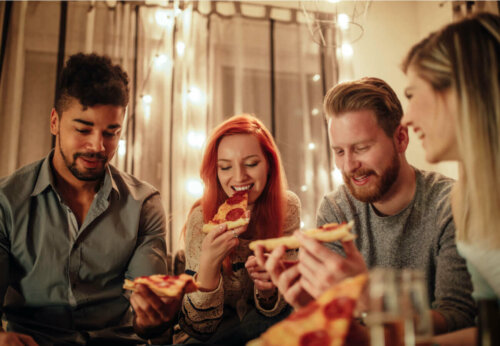Should You Avoid Eating Carbohydrates at Night?

One of the classic controversies in nutrition is whether people should avoid carbohydrates at night. These nutrients have a fundamentally energetic function. Thus, some experts believe that you don’t need them while you’re sleeping.
However, other trends do justify their inclusion. In this article, we’re going to explain what scientific literature recommends so that you’re aware of the benefits and drawbacks.
The assimilation of carbohydrates depends on the time of day
According to the latest advances in chronobiology, the science that studies the interactions between the body and nutrients depending on when they’re consumed, the body better tolerates carbohydrates at night than in the morning.
Specifically, it explains that including sugars in the first meal of the day can increase the risk of metabolic pathologies. For this reason, fasting has become very popular. However, you can consume a certain amount of carbohydrates at night without this negatively affecting your body, as long as they have a low glycemic index and you do so within the framework of a normocaloric diet.
In spite of everything, the best thing to do in order to assimilate these nutrients is to have dinner before the sun goes down. A study published in the journal Nutrients states this. Likewise, sedentary people should make sure that the last meal of the day is smaller than the meal they eat at noon.
Although it’s possible to include carbohydrates at dinner in suitable proportions, consuming too many is associated with an increased risk of obesity and metabolic syndrome.
Scientific literature states that consuming simple sugars after sunset negatively impacts the body. Meanwhile, after midnight, only protein consumption is recommended.

The recommendations are different for athletes
If a person plays sports, they may need to consume carbohydrates at night. This is because sugars would have a recuperative function at this time of day since they’d promote a resynthesis of glycogen stores, especially if they’re combined with protein.
Research published in the Journal of the International Society of Sports Nutrition, which highlights the importance of nutrient timing when it comes to maximizing muscle recovery, states this.
Consuming sugars at night could improve an athlete’s performance in subsequent training sessions and reduce the risk of muscle tears that result from a depletion of nutrient stores.
Limit carbohydrates at night to lose weight
Although you can include a small serving of carbohydrates at dinner, this isn’t always a good idea. If you want to lose weight, it may be beneficial to restrict your sugar intake.
Instead, it might be best to maximize your intake of lipids and proteins, especially during the night. This way, you generate a greater feeling of fullness. Thus, you only restrict carbohydrates in this meal, as they’re allowed during the rest of the day.
People tend to accept and adhere to these types of dietary protocols. The result is usually positive since they generate an energy imbalance in favor of expenditure. In addition, eating light dinners facilitates rest and avoids intestinal discomfort during the night.

For these reasons, many nutritionists defend restricting sugar intake during the last hours of the day. However, it may me possible to establish a weight loss protocol with an adequate amount of carbohydrates at dinner, as long as they have a low glycemic index.
Remember that it’s crucial to restrict your intake of simple sugars after the last meal of the day. Late-night snacking can negatively affect your health.
Yes, you can eat carbohydrates at night
As you’ve seen, it’s possible to eat carbohydrates at night if you take some considerations into account. Carbohydrates have an energetic and recuperative function. This is why they have an important role in the diets of many athletes.
In the case of healthy people, they need to carefully assess whether or not to restrict these nutrients during the final hours of the day, although both protocols have their pros and cons. The most advisable action is to evaluate your situation and personal goals with a nutritionist.
One of the classic controversies in nutrition is whether people should avoid carbohydrates at night. These nutrients have a fundamentally energetic function. Thus, some experts believe that you don’t need them while you’re sleeping.
However, other trends do justify their inclusion. In this article, we’re going to explain what scientific literature recommends so that you’re aware of the benefits and drawbacks.
The assimilation of carbohydrates depends on the time of day
According to the latest advances in chronobiology, the science that studies the interactions between the body and nutrients depending on when they’re consumed, the body better tolerates carbohydrates at night than in the morning.
Specifically, it explains that including sugars in the first meal of the day can increase the risk of metabolic pathologies. For this reason, fasting has become very popular. However, you can consume a certain amount of carbohydrates at night without this negatively affecting your body, as long as they have a low glycemic index and you do so within the framework of a normocaloric diet.
In spite of everything, the best thing to do in order to assimilate these nutrients is to have dinner before the sun goes down. A study published in the journal Nutrients states this. Likewise, sedentary people should make sure that the last meal of the day is smaller than the meal they eat at noon.
Although it’s possible to include carbohydrates at dinner in suitable proportions, consuming too many is associated with an increased risk of obesity and metabolic syndrome.
Scientific literature states that consuming simple sugars after sunset negatively impacts the body. Meanwhile, after midnight, only protein consumption is recommended.

The recommendations are different for athletes
If a person plays sports, they may need to consume carbohydrates at night. This is because sugars would have a recuperative function at this time of day since they’d promote a resynthesis of glycogen stores, especially if they’re combined with protein.
Research published in the Journal of the International Society of Sports Nutrition, which highlights the importance of nutrient timing when it comes to maximizing muscle recovery, states this.
Consuming sugars at night could improve an athlete’s performance in subsequent training sessions and reduce the risk of muscle tears that result from a depletion of nutrient stores.
Limit carbohydrates at night to lose weight
Although you can include a small serving of carbohydrates at dinner, this isn’t always a good idea. If you want to lose weight, it may be beneficial to restrict your sugar intake.
Instead, it might be best to maximize your intake of lipids and proteins, especially during the night. This way, you generate a greater feeling of fullness. Thus, you only restrict carbohydrates in this meal, as they’re allowed during the rest of the day.
People tend to accept and adhere to these types of dietary protocols. The result is usually positive since they generate an energy imbalance in favor of expenditure. In addition, eating light dinners facilitates rest and avoids intestinal discomfort during the night.

For these reasons, many nutritionists defend restricting sugar intake during the last hours of the day. However, it may me possible to establish a weight loss protocol with an adequate amount of carbohydrates at dinner, as long as they have a low glycemic index.
Remember that it’s crucial to restrict your intake of simple sugars after the last meal of the day. Late-night snacking can negatively affect your health.
Yes, you can eat carbohydrates at night
As you’ve seen, it’s possible to eat carbohydrates at night if you take some considerations into account. Carbohydrates have an energetic and recuperative function. This is why they have an important role in the diets of many athletes.
In the case of healthy people, they need to carefully assess whether or not to restrict these nutrients during the final hours of the day, although both protocols have their pros and cons. The most advisable action is to evaluate your situation and personal goals with a nutritionist.
All cited sources were thoroughly reviewed by our team to ensure their quality, reliability, currency, and validity. The bibliography of this article was considered reliable and of academic or scientific accuracy.
- Lopez Minguez J., Gómez Abellán P., Garaulet M., Timing of breakfast, lunch, and dinner. Effects on obesity and metabolic risk. Nutrients, 2019.
- Grant CL., Coates AM., Dorrian J., Kennaway DJ., et al., Timing of food intake during simulated night shift impacts glucose metabolism: a controlled study. Chronobiol Int, 2017. 34 (8): 1003-1013.
- Kerksick CM., Arent S., Schoenfeld BJ., Stout JR., et al., International society of sports nutrition position stand: nutrient timing. J Int Soc Sports Nutr, 2017.
This text is provided for informational purposes only and does not replace consultation with a professional. If in doubt, consult your specialist.








